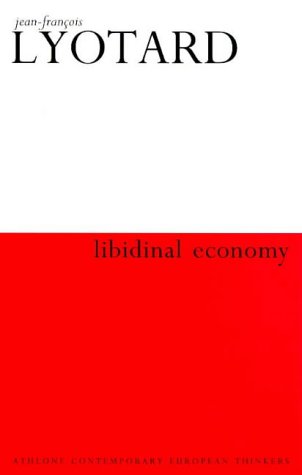

 |

|

The average rating for Libidinal economy based on 2 reviews is 2.5 stars.
Review # 1 was written on 2019-12-20 00:00:00 David Halbauer David HalbauerLet's be clear. This isn't an evil book, despite what Lyotard said. It has an undeniably evil vibe, what with its disgusting imagery of the libidinal skin, its searing hatred of criticism and truth-seeking, its constant anti-humanist provocations, and of course the notorious claim that the English workers of the industrial revolution loved their miserable lives. But the book itself isn't evil, or at least, you won't think so by the time it's done reprogramming you. So that's an important caveat: if after finishing Libidinal Economy and wiping the sweat from your permanently furrowed brow, you've managed to hang onto your liberal and humanist zeroes, you're going to think this book is fucking evil. Chances are you'll think it's a pointless and incoherent mess with a clear right-wing theoretical bent, likely fascist, and you'll never want to read it again. There's a good reason for this: it is incoherent, and Lyotard does seem to get off on inflaming the leftists he used to roll with. What's this about reprogramming, then? Arguably Libidinal Economy does not attempt to persuade in any traditional sense. It operates by a sort of hideous seduction. If you think the leftist understanding of "desire" is lacking, and if you have a feeling that "alienation" and "false consciousness" don't accurately map how political reality functions... well, then you've probably already read Anti-Oedipus, and you probably liked it if you're reading Libidinal Economy, so you're primed to swallow some preposterous and unsubstantiated shit. Especially when its as self-aware as this. So when Lyotard spends the next 200-odd pages tearing apart the foundations of the 20th century French leftist belief system, you'll either digest it or throw it back up. I digested, I metabolised. Nothing in this book is true, and yet I agreed with it all. Except, and this is the problem with all accelerationist texts, we're rapidly heading towards our demise as a civilisation. So sure, capitalism frees up intensities and jouissance blah blah blah, but it's running on a pretty short timer at this point. What a shame. P.S. If anyone ever actually decides to write a guidebook to this "rumbling menace" of a book, I'm sure there's a lot of money in it for you. Well, not really, but I'll steal the PDF and email you in gratitude. |
Review # 2 was written on 2019-02-26 00:00:00 Todd Wells Todd WellsLibidinal Economy was characterized by its repentant author as an "evil" book. Why? Like Deleuze & Guattari's Anti-Oedipus, Libidinal Economy can be seen partially as a response to the question: why do the masses desire their own oppression? Lyotard's response is as unequivocal as it is infamous: "the English unemployed did not become workers to survive, they - hang on tight and spit on me - enjoyed the hysterical, masochistic, whatever exhaustion it was of hanging on in the mines, in the foundries, in the factories, in hell, they enjoyed it, enjoyed the mad destruction of their organic body which was indeed imposed upon them..." According to Lyotard, capital neither alienates (as in Marx) nor represses (as in Freudo-Marxists) desire but on the contrary generates innumerable new modes of jouissance. Accordingly, there can be no recourse to unalienated labour on which to found an emancipatory politics, but rather the anarchic jouissance of capital must be taken to its own conclusion. Like Deleuze & Guattari, Lyotard is heavily influenced by Nietzsche. Like Nietzsche, Lyotard sees in communist politics nothing but a secularized version of Christian morality, a politics based on ressentiment. He skewers middle class French communist intellectuals as being patronizing moralists and calls for an end to "commiseration" with the proletariat. Now certainly one can level a critique against middle class French communist intellectuals without much of a problem. But it's ironic coming from Lyotard, who was precisely a middle class French (ex-)communist intellectual. When Lyotard asserts that "we prefer to burst under the quantitative excesses that you judge the most stupid," one has to question who exactly the "we" in this sentence is (surely not the proletariat...) In true Nietzschean fashion, Libidinal Economy is a polemic against the perceived nihilism of Marxism and psychoanalysis. And yet the book seems curiously nihilistic itself. Deleuze won't do, Baudrillard won't do, and Marx and Freud are right out. At its worst, Libidinal Economy is pure accelerationism, advocating for the worst excesses of capital in the name of jouissance. It's frustrating because the themes Lyotard teases us with (especially the deconstruction of the concept of "primitive societies" found in Marx and Lévi-Strauss) are so interesting. As someone who has read Nietzsche, Marx, Lacan, etc., as someone who's interested in the politics of desire, I'm at least potentially interested in the politics Lyotard is putting forward here. But he really was right, this is an "evil" book. |
CAN'T FIND WHAT YOU'RE LOOKING FOR? CLICK HERE!!!